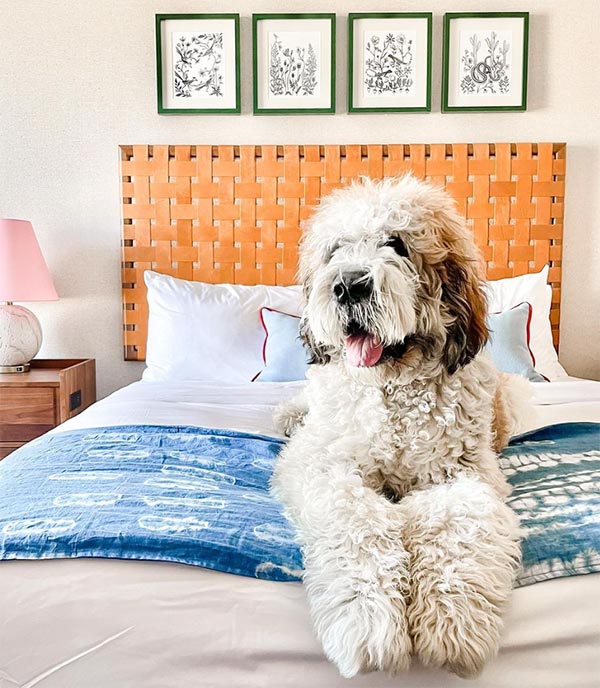Saint Berdoodle, also known as Saint Berpoo, St. Berpoo, and St. Berdoodle, is a gentle giant dog that has gained some popularity in the past few years, and for good reasons too.
The working dog is a cross between a Saint Bernard and Poodle dog breeds. Saint Berdoodle is a loving companion with a wonderful personality. With their adorable teddy bear like appearance, they will charm you instantly.
Saint Berdoodles are friendly, intelligent, loyal, and eager to please personality, making this dog breed a good family dog. They want nothing more than your undivided love and attention. Saint Berdoodle is considered low to moderate shedders depending on which coat they inherit.
So is Saint Berdoodle right for you? Let's take a look.
Breed Characteristics
Temperament | Gentle, loving, social |
Intelligence | high |
Affection/Friendliness | Very affectionate with family |
Trainability | Moderate to high |
Moderate – obedience, puzzle toys, social play | |
Exercise Needs | Moderate – daily walks, yard play |
Apartment Living | Not suitable |
Family Friendly | Yes, great with kids and families |
Pet Friendly | Yes, with socialization |
Drooling Level | Moderate to high |
Energy Level | moderate |
Loneliness Tolerance | low |
Adaptability | Moderate |
Tendency to bark | moderate |
Origin of Saint Berdoodles
The Saint Berdoodle is a mixed breed dog that was bred as a companion dog. It is the mix of a Saint Bernard dog and a standard Poodle, resulting in a low-shed dog with the smarts of a Poodle and the sweetness of a Saint Bernard.
The origins of the Saint Berdoodle are unknown since there may have been accidental or unintentional, or undocumented mixes of the breeds. However, the popularity of Poodle mixes in the 1980s increased when the breed began to be intentionally bred as a designer breed. Doodle mixes were rising in popularity for their low shed and hypoallergenic coats, and, likely, the Saint Berdoodle as we know it today began then.
This mixed breed is not recognized by any major kennel club like American Kennel Club, given the lack of predictability or standard for the hybrid breed at this time. They are, however, included in a few designer dog clubs, including the Designer Dogs Kennel Club, American Canine Hybrid Club, Dog Registry Of America, Designer Breed Registry, and the International Designer Canine Registry.

Breed Overview
Height: 24-30"
Weight: 110–200 lbs
Height: 22-28"
Weight: 90–160 lbs
Breed Group
Designer
Life Span
10-12 years
Coat
Wavy or curly
Coat Length
Medium to long
Hypoallergenic
Yes (low-shedding)
Shedding Level
Low to moderate
Size
The Saint Berdoodle size can vary, but generally, it is a large dog breed and can rival the Bernese Mountain Dog and Newfoundland for size. While there is still some variance depending on the parentage, you can expect most Saint Berdoodle's to be 24-30 inches high and between 100-180 pounds heavy full grown. The more their lineage leans towards the Saint Bernard genes, the bigger a dog they will be.
Mini Saint Berdoodles do exist through breeding Saint Bernard with a mini Poodle. They typically weigh between 30-55 pounds and 14-24 inches tall.
Personality
Saint Berdoodle's have very winning personalities. They are smart, loyal, social, and friendly dogs who love their people more than anything. They are affectionate and can be quite calm and well-mannered if trained and socialized properly. However, they love being the center of attention and will not appreciate any other animals stealing away their owner's attention.
Saint Berdoodle Appearance/Colors
A Saint Berdoodle is generally one of four main colorings: white and brown, white and black, red with white accents, and white with red accents.
Saint Berdoodle coat type will depend very much on parentage. Their coat can be smooth and long like a Saint Bernard, or curly, wiry, and short like a Poodle. Second-generation Saint Berdoodles (Berdoodle puppies with Berdoodle parents) have slightly more predictable coats, so be sure to know the parentage of your Saint Berdoodle puppy if the coat type is important to you.
Temperament
Saint Berdoodles make excellent family dogs. They love to be the center of attention and thrive in family settings. They may be a bit big and bumbling to have around very small children and may accidentally hurt children or small pets.
Saint Berdoodles have affable and calm temperaments that make them great therapy and service dogs. Deepening on the coat may be partially hypoallergenic, making them suitable for people who are sensitive to dog dandruff. They are loyal dogs and can be a bit wary of strangers at first but are quick to warm up to anyone who shows them some love.
Diet/Nutritional Needs
When it comes to deciding whether or not to get a Saint Berdoodle is a large amount of food you will have to commit to buying for this large dog breed.
Saint Berdoodles need quality large dog breeds dry food fed to them twice a day, the daily quantity of which could be anywhere from 4-10 cups. Consult with your veterinarian about your dog's diet and the correct amount for your puppy as it grows, depending on its size, age, and activity levels. Fresh water should always be available at all times.
Activity/Exercise Needs
Saint Berdoodles require moderate amounts of exercise. Purebred poodles are an active, energetic breed, and Purebred Saint Bernards are laid-back and chill dogs, so the needs of a Saint Bernard Poodle mix will be somewhere in the middle. They should get daily activity, either a walk or a rousing game of fetch. They enjoy off-leash dog parks as social dogs but will also enjoy having a large, fenced-in yard to explore.
You will need to ensure that your dog is well trained and that you are equipped to handle this large dog for walks so that you don't lose control. Because of the massive size of these dogs, they cannot exercise indefinitely and will tire and need to rest. Don't expect them to be able to go for long hikes or to be suitable cycling buddies.
If you are considering getting Saint Berdoodle puppies, be sure to socialize them at a young age and put them in obedience training school as soon as possible.
Grooming Needs

Image Source: Ig @toast_the_stberdoodle
Do Saint Berdoodles shed? How much grooming does it need? The shedding potential for this hybrid dog breed depends greatly on how it leans in its lineage. If they inherit the hypoallergenic qualities of their Poodle parents, they require less grooming needs.
Generally, they are low-shedding dogs because of their poodle parent, and you still will deal with some level of dog hair. Saint Berdoodle will require daily brushing to maintain their coats and may require more during shedding season. They can be bathed as needed or once a month.
Regularly check their eyes and ears for issues, infections, or irritation. Nails should be trimmed once a month or as needed. It would be best if you also aimed to brush your dog's teeth daily, or at least a few times a week, to maintain their dental health.
Adaptability
Saint Berdoodle thrives best when they are the center of attention in a family setting. They need the training to be careful around small children, but they can be taught to be careful. They do not make good apartment dogs but rather thrive in houses with a big fenced-in yard to roam in. They can be sensitive to high temperatures but love the cold. They do well with other dogs and can be trained to be careful and respectful of other household pets.
Trainability
Saint Berdoodles are easy to train, with the keen intelligence of a Poodle and the people-pleasing nature of a Saint Bernard. They may be a bit willful at times, but with positive reinforcement and consistency, they can be trained to be respectful and well-mannered pups. Socializing and training from a young age are important to instill good habits early on.
Life Expectancy
Saint Berdoodles have a life expectancy of 10-12 years.
Cost
Saint Berdoodle cost can vary anywhere between $1,000-$3,000 from a breeder. However, you may be able to find a Saint Berdoodle from a rescue or animal shelter. Be sure to consider adopting before purchasing.

Image Source: Ig @toast_the_stberdoodle
Potential Health Problems
Hybrid designer dogs are generally healthier than their purebred parent breeds. As such, Saint Berdoodles have the advantage of not being overly prone to health issues. As new pet parents, it's best to do your homework on the breed first to get one.
Hip Dysplasia
Hip dysplasia is a genetic condition resulting in a dog's joint malformation.
Ear Infections
Saint Berdoodle's floppy ears are prone to infection, irritation, and wax build-up. Be sure to clean your dog's ear regularly with ear cleaner to prevent ear infections.
Wobbler Syndrome
Wobbler Syndrome is a disease of the neck and spine commonly found in large and giant dog breeds. Compression of the spinal cord results in nervous system issues and neck pain.
Bloat
Bloat happens when there is a build-up of gas in a dog's stomach, leading to the twisting of the stomach and digestive issues that can be life-threatening. To prevent bloat in your Saint Berdnoodle, feed your dog smaller meals daily, use a food puzzle, slow feeder or combine wet and dry food. Avoid exercising after a meal.
Skin Problems
The long hair of a Saint Berdoodle can lead to tangles which can lead to skin infections, particularly a condition called "hot spots." Depending on the severity, veterinarians may treat it with a combination of antibiotics, anti-itching cream, and an e-collar.
Willebrand's Disease
Willebrand's disease affects the blood's ability to clot correctly. There is no treatment for the conditions, but you can manage the symptoms.
